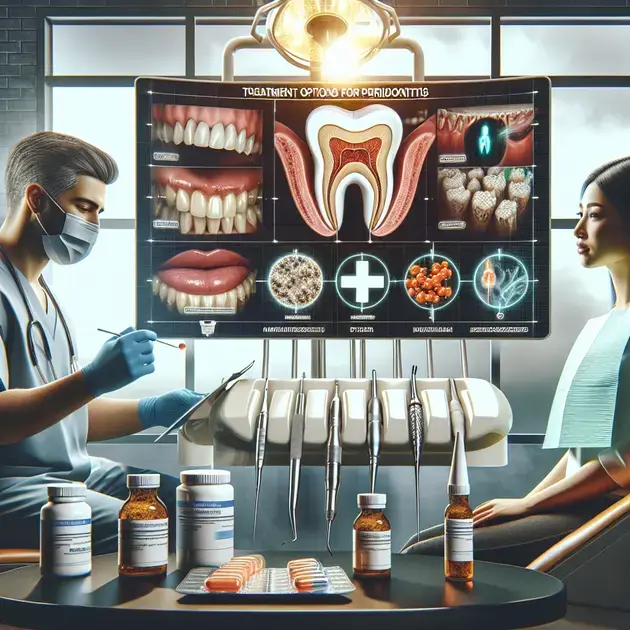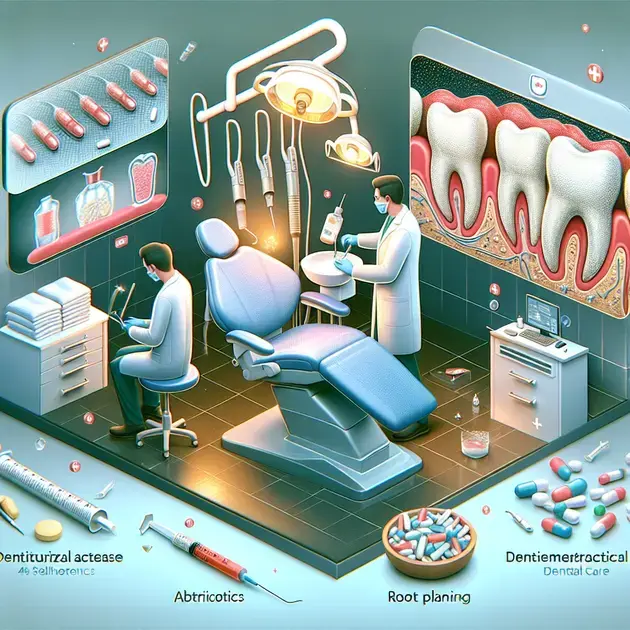When it comes to treating periodontitis, finding an effective medication is crucial. Periodontitis is a severe gum infection that damages the soft tissue and destroys the bone that supports your teeth. Without proper treatment, it can lead to tooth loss and other serious health issues.
In recent studies, the use of antibiotics in combination with scaling and root planing has shown promising results in the treatment of periodontitis. This combination approach helps to reduce inflammation, control bacterial growth, and prevent further damage to the gums and bone. Understanding the importance of effective medication for periodontitis treatment is key to preserving your oral health and overall well-being.

The Benefits of Antibiotics in Periodontitis Treatment
Antibiotics play a crucial role in the treatment of periodontitis, a serious gum infection that damages the soft tissue and destroys the bone that supports your teeth. When used as part of a comprehensive treatment plan, antibiotics can effectively eliminate the bacteria causing the infection and help prevent its recurrence.
One of the main benefits of antibiotics in periodontitis treatment is their ability to reach deep into the pockets of infected gum tissue, where bacteria thrive and cause damage. Antibiotics can also help reduce inflammation and promote faster healing of the gums.
To incorporate antibiotics into your periodontal treatment, it is essential to consult with a qualified dentist or periodontist. They will evaluate the severity of your condition and determine the appropriate type of antibiotics, dosage, and duration of the treatment. It is crucial to follow their instructions carefully to ensure the best results.
Some commonly prescribed antibiotics for periodontitis include doxycycline, minocycline, and metronidazole. These antibiotics are usually prescribed in conjunction with other treatments such as scaling and root planing to achieve optimal results.
In addition to their effectiveness in treating periodontitis, antibiotics can also help prevent complications such as tooth loss and systemic health problems associated with untreated gum disease. By incorporating antibiotics into your treatment plan, you can improve your oral health and overall well-being.
Combining Medication with Scaling and Root Planing
Scaling and root planing is a non-surgical procedure used to treat gum disease by removing plaque and tartar buildup from the teeth and roots. When combined with medication, such as antibiotics, scaling and root planing can effectively eliminate the bacteria causing the infection and promote healing of the gum tissue.
The first step in combining medication with scaling and root planing is to consult with your dentist or periodontist to determine the most appropriate treatment plan for your condition. They will assess the extent of your gum disease and recommend the necessary medications to complement the scaling and root planing procedure.
Before undergoing scaling and root planing, your dentist may prescribe antibiotics to reduce the bacterial load in your mouth and help control the infection. This pre-treatment with antibiotics can improve the effectiveness of the scaling and root planing procedure and enhance the overall outcomes of your gum disease treatment.
During the scaling and root planing procedure, your dentist will use specialized instruments to remove plaque and tartar from the surfaces of your teeth and roots. This deep cleaning process helps eliminate bacteria and toxins that contribute to gum disease and promotes the healing of the gum tissue.
After completing the scaling and root planing procedure, your dentist may prescribe antibiotics to further reduce the risk of infection and support the healing process. It is essential to follow their post-operative instructions carefully and take the prescribed medications as directed to ensure successful treatment outcomes.
Preserving Oral Health with Effective Treatment
Preserving oral health is essential for maintaining overall well-being and preventing serious dental issues such as periodontitis. Effective treatment options, including antibiotics, scaling and root planing, and regular dental check-ups, play a crucial role in preserving oral health and preventing the progression of gum disease.
By incorporating antibiotics into your periodontal treatment plan, you can target the bacteria causing the infection and reduce inflammation in the gums. This can help prevent further damage to the supporting structures of your teeth and promote long-term oral health.
In addition to antibiotic therapy, scaling and root planing are essential components of effective periodontal treatment. This deep cleaning procedure removes plaque and tartar from below the gumline and smooths out the root surfaces to prevent bacterial growth and promote gum tissue healing.
Regular dental check-ups and cleanings are also crucial for preserving oral health and monitoring the progress of your gum disease treatment. Your dentist can assess the condition of your gums, recommend appropriate treatment adjustments, and provide guidance on maintaining good oral hygiene practices at home.
By following a comprehensive treatment plan that includes antibiotics, scaling and root planing, and ongoing dental care, you can effectively preserve your oral health, prevent complications from gum disease, and enjoy a healthy, beautiful smile for years to come.

Combining Medication with Professional Dental Care
When it comes to oral health, combining medication with professional dental care can play a crucial role in maintaining and improving the overall well-being of your teeth and gums. Medications prescribed by your dentist or healthcare provider can help to manage specific dental issues, such as infections, inflammation, or pain. However, these medications should always be used in conjunction with regular visits to your dentist for preventive care and professional treatment.
By following a prescribed medication regimen and attending routine dental check-ups and cleanings, you can ensure that any dental problems are addressed promptly and effectively. Your dentist will be able to monitor your progress, make any necessary adjustments to your medication, and provide specialized treatments as needed.
It’s important to remember that medication is only one part of the equation when it comes to maintaining good oral health. Professional dental care, including cleanings, examinations, and treatments, is essential for preventing and addressing any issues that may arise. By combining medication with regular dental visits, you can ensure that your teeth and gums stay healthy and strong for years to come.
In conclusion, the combination of medication and professional dental care is a powerful tool for maintaining optimal oral health. By following your prescribed medication regimen and scheduling regular visits to your dentist, you can take proactive steps to protect your teeth and gums from potential problems.
Enhancing Treatment Effectiveness with Lifestyle Changes
When it comes to improving the effectiveness of dental treatments, incorporating lifestyle changes into your routine can make a significant difference. Whether you are undergoing a procedure for a specific dental issue or simply trying to maintain your oral health, lifestyle factors such as diet, exercise, and stress management can impact the outcome of your treatment.
For example, eating a balanced diet rich in vitamins and minerals can help to support the healing process and promote overall oral health. Regular exercise can improve circulation and reduce inflammation, which can aid in recovery after dental procedures. Additionally, managing stress through relaxation techniques or mindfulness practices can contribute to a faster and more successful treatment outcome.
By making small but impactful changes to your lifestyle, you can enhance the effectiveness of dental treatments and improve your overall oral health. Your dentist may also provide guidance on lifestyle modifications that are specifically tailored to your individual needs and treatment goals.
In conclusion, incorporating healthy lifestyle changes alongside dental treatments can lead to better outcomes and long-term oral health benefits. By taking a holistic approach to your oral care, you can maximize the effectiveness of your treatments and enjoy a healthier smile.
Customized Approach to Managing Gum Disease
Managing gum disease requires a personalized and comprehensive approach that takes into account the specific needs and challenges of each patient. While medications can play a role in treating gum disease, a customized treatment plan that addresses the underlying causes and risk factors is essential for long-term success.
Your dentist will conduct a thorough assessment of your oral health, including evaluating the extent of gum disease, identifying any contributing factors such as poor oral hygiene or underlying health conditions, and determining the most appropriate course of treatment. This may involve a combination of professional cleanings, periodontal therapies, and lifestyle modifications.
In addition to traditional treatments, such as scaling and root planing, your dentist may recommend specialized medications or procedures to target the unique characteristics of your gum disease. It is important to follow your dentist’s recommendations closely and attend regular follow-up appointments to monitor your progress and make any necessary adjustments to your treatment plan.
By taking a customized approach to managing gum disease, you can effectively control the progression of the condition, reduce inflammation, and protect the long-term health of your gums and teeth. With the right combination of medication, professional care, and lifestyle changes, you can achieve optimal oral health and prevent future complications.
Conclusion
Combining medication with professional dental care is essential for maintaining optimal oral health. Medications prescribed by your healthcare provider help manage specific dental issues, but they must be complemented with regular dental visits for preventive care and treatment. By following your prescribed medication regimen and attending routine check-ups, you can ensure prompt and effective management of any dental problems.
Lifestyle changes, such as maintaining a balanced diet, regular exercise, and stress management, can significantly enhance the effectiveness of dental treatments. These adjustments support the healing process, improve overall oral health, and contribute to a successful treatment outcome. Your dentist may offer tailored guidance on lifestyle modifications to align with your treatment goals.
Managing gum disease requires a personalized approach that considers individual needs and challenges. Alongside medications, a customized treatment plan addressing underlying causes and risk factors is crucial for long-term success. By following your dentist’s recommendations, including specialized medications and procedures, you can control disease progression, reduce inflammation, and safeguard the health of your gums and teeth.



